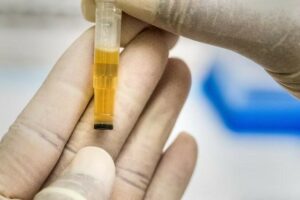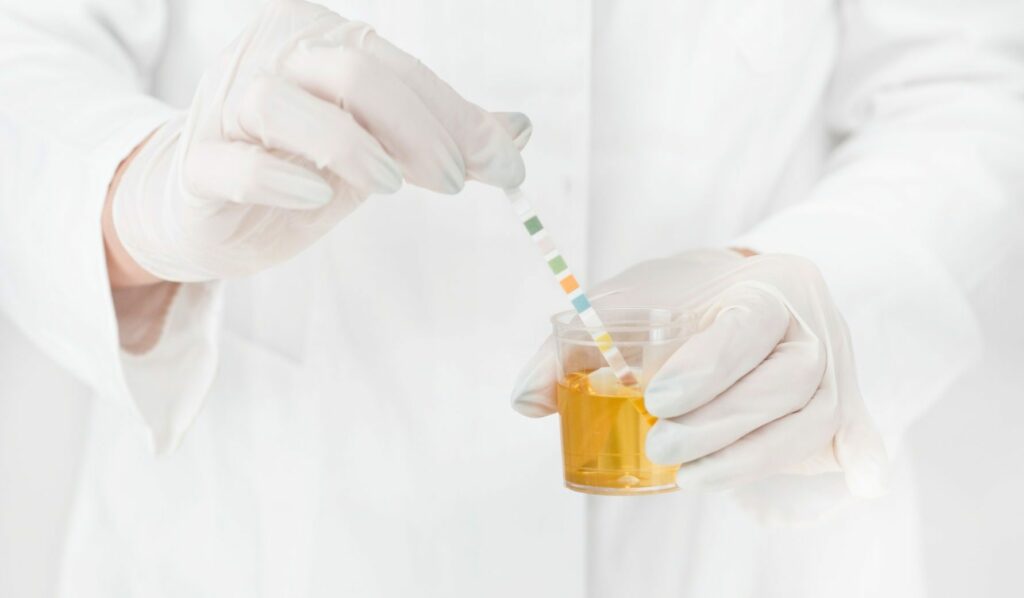Ketones in urine are a topic that often raises questions and concerns among individuals on ketogenic diets or those managing certain medical conditions. Ketones are a natural byproduct of the body’s metabolism, but their presence in urine can signal various health scenarios. In this blog, we’ll delve into the reasons behind ketones in urine, explore potential ketones in urine treatment, and empower you with the knowledge to navigate this aspect of your health journey.
Contents
What Are The Reasons Of Ketones In Urine?
 Ketones in urine, a condition known as ketonuria, can arise from various factors. Understanding the reasons behind the presence of ketones is crucial for effective management. Here are some common causes:
Ketones in urine, a condition known as ketonuria, can arise from various factors. Understanding the reasons behind the presence of ketones is crucial for effective management. Here are some common causes:
- Ketogenic Diet: Following a low-carbohydrate, high-fat ketogenic diet can induce ketosis, where the body relies on fat for energy. This dietary shift produces ketones, leading to their presence in urine.
- Diabetes: Uncontrolled diabetes, especially when insulin levels are insufficient, can result in the body breaking down fat for energy, causing an increase in ketone production. This is particularly relevant in diabetic ketoacidosis (DKA), a serious and potentially life-threatening complication.
- Fasting or Starvation: Extended periods of fasting or severe calorie restriction can prompt the body to utilize stored fat for energy, generating ketones. This is a natural response during times of food scarcity.
- Alcoholism: Chronic alcohol consumption can lead to nutritional deficiencies and a shift in metabolism, causing the liver to produce excess ketones. This can contribute to alcoholic ketoacidosis.
- Certain Medications: Medications like sodium-glucose cotransporter-2 (SGLT2) inhibitors, often prescribed for diabetes, can increase ketone production. People taking these medications should be monitored for ketonuria.
- Infections and Illness: Serious infections or illnesses that cause a decrease in food intake and energy utilization may trigger the body to break down fat stores, resulting in ketonuria.
It’s essential to note that while ketosis due to a ketogenic diet is generally considered safe, ketonuria associated with conditions like diabetes or alcoholism requires prompt medical attention. Monitoring ketone levels, staying hydrated, and seeking professional advice when necessary are crucial steps in managing ketones in urine.
What Are Some Ketones In Urine Treatment Options?
Ketones in urine treatment, or ketonuria, often depend on the underlying cause. Here are some medical approaches and interventions for managing ketones in urine:
Diabetes Management
Individuals with diabetes, particularly type 1 diabetes, may experience ketonuria when their insulin levels are insufficient to properly regulate blood glucose. Tight control of blood sugar levels through insulin therapy and other diabetes medications is crucial. Proper management not only helps prevent the development of ketones but also minimizes the risk of diabetic ketoacidosis (DKA), a serious complication associated with high ketone levels.
Insulin Administration
Insulin is a key hormone that regulates glucose metabolism in the body. For individuals with diabetes, the administration of insulin is fundamental in preventing the breakdown of fats into ketones. Proper dosage adjustments, which may include both basal and bolus insulin, are essential to match individual needs and lifestyle factors. Regular monitoring of blood glucose levels informs these adjustments to maintain optimal control.
Fluid Replacement
In cases of severe ketonuria or DKA, fluid replacement is a critical aspect of medical intervention. Intravenous (IV) fluids are administered to correct dehydration, restore fluid balance, and flush out excess ketones from the body. This approach helps address the metabolic imbalances associated with ketone production.
Electrolyte Monitoring and Correction
Elevated ketone levels, especially in conditions like DKA, can lead to imbalances in electrolytes. Regular monitoring and correction of electrolyte levels, including potassium, sodium, and chloride, are vital components of the treatment plan. This ensures the proper functioning of essential bodily functions and prevents complications arising from electrolyte disturbances.
Nutritional Support
Nutritional interventions play a role in managing ketonuria, particularly in cases related to dietary factors. Healthcare professionals may guide you in adjusting your diet to achieve a balance between carbohydrates, fats, and proteins. This balance helps minimize the production of ketones while maintaining adequate energy for the body’s needs.
Management of Underlying Conditions
Treating the underlying cause of ketonuria is essential for effective management. This may involve addressing infections, managing issues related to alcohol consumption, or implementing strategies to cope with metabolic disorders. Targeting the root cause contributes to the reduction of ketone production.
Medication Adjustments
 Some medications, such as sodium-glucose cotransporter-2 (SGLT2) inhibitors used in diabetes management, can contribute to increased ketone levels. Healthcare providers may consider adjusting the medication or dosage to minimize this side effect while still effectively managing the primary condition.
Some medications, such as sodium-glucose cotransporter-2 (SGLT2) inhibitors used in diabetes management, can contribute to increased ketone levels. Healthcare providers may consider adjusting the medication or dosage to minimize this side effect while still effectively managing the primary condition.
Regular Monitoring
Individuals at risk of ketonuria, especially those with diabetes, may be advised to monitor their ketone levels regularly. This can be done using urine or blood ketone testing devices. Regular monitoring allows for early detection of elevated ketone levels, enabling timely intervention and adjustment of treatment plans.
Medical Supervision
In severe cases of ketonuria or when symptoms are present, seeking medical attention is crucial. Hospitalization may be necessary for close monitoring, intensive care, and prompt intervention. Healthcare professionals can provide the necessary expertise to manage complex cases and ensure the best possible outcomes for the individual. Regular follow-ups and ongoing medical supervision are important to assess progress and make necessary adjustments to the treatment plan.
It’s important to note that the approach to treatment will be individualized based on the specific circumstances and health status of the person experiencing ketones in the urine. Seeking guidance from healthcare professionals ensures appropriate and tailored management strategies.
How Can I Reduce Ketones In Urine Naturally?
Reducing ketones in urine naturally involves making adjustments to your lifestyle, diet, and overall health practices. Here are some strategies that may help:
- Hydration
Staying well-hydrated is crucial for flushing out excess ketones from your body. Drink plenty of water throughout the day to maintain proper hydration. Adequate fluid intake helps dilute urine and reduces the concentration of ketones.
- Balanced Nutrition
Adjust your diet to ensure a balanced intake of carbohydrates, fats, and proteins. While following a ketogenic diet may naturally lead to ketone production, modifying the ratio of macronutrients can help regulate ketone levels. Include a variety of nutrient-rich foods in your diet.
- Regular Meals
Consistent and regular meals can help stabilize blood sugar levels and prevent the body from relying excessively on fat for energy. This can be particularly important for individuals prone to ketonuria, such as those with diabetes.
- Physical Activity
Engage in regular physical activity to promote glucose utilization and decrease reliance on fat metabolism. Exercise can help maintain insulin sensitivity and improve overall metabolic health.
- Avoid Excessive Fasting
Extended periods of fasting can lead to increased ketone production. If you are prone to ketonuria, consider avoiding prolonged fasting or consult with a healthcare professional for personalized guidance.
- Monitor Portion Sizes
Be mindful of portion sizes, especially when consuming high-fat foods. While healthy fats are an essential part of any diet, excessive intake can contribute to elevated ketone levels.
- Manage Stress
Chronic stress can impact hormone levels and metabolic processes, potentially leading to increased ketone production. Implement stress management techniques such as meditation, deep breathing, or regular physical activity.
It’s important to note that while these strategies can be beneficial for many individuals, the effectiveness may vary based on individual health conditions. Before making significant changes to your diet or lifestyle, especially if you have an underlying health condition, it’s advisable to consult with a healthcare professional for personalized advice and guidance.
Does Eating Reduce Ketones?
 Yes, eating can reduce ketones in the body, particularly if the meal contains a significant amount of carbohydrates. When you consume carbohydrates, your body breaks them down into glucose. This becomes the primary source of energy. In the presence of sufficient carbohydrates, insulin is released to facilitate the uptake of glucose by cells for energy. As a result, the body shifts away from relying on fat metabolism and ketone production decreases. This process is particularly relevant for individuals following a ketogenic diet, as reintroducing carbohydrates can transition the body from a state of ketosis to relying on glucose for energy.
Yes, eating can reduce ketones in the body, particularly if the meal contains a significant amount of carbohydrates. When you consume carbohydrates, your body breaks them down into glucose. This becomes the primary source of energy. In the presence of sufficient carbohydrates, insulin is released to facilitate the uptake of glucose by cells for energy. As a result, the body shifts away from relying on fat metabolism and ketone production decreases. This process is particularly relevant for individuals following a ketogenic diet, as reintroducing carbohydrates can transition the body from a state of ketosis to relying on glucose for energy.
Additionally, eating regular and balanced meals helps maintain stable blood sugar levels, reducing the need for the body to utilize stored fats for energy. The combination of carbohydrate intake and consistent eating patterns contributes to a metabolic state where ketone production is minimized. It’s important to note that the extent to which eating reduces ketones can vary based on individual factors such as overall diet, metabolic health, and activity levels.
Conclusion
In conclusion, ketones in urine treatment are crucial for anyone navigating a ketogenic diet, managing diabetes, or facing related health concerns. By exploring the reasons behind ketonuria and learning about various treatment options, including lifestyle adjustments and medical interventions, individuals can proactively address this aspect of their health. Whether it’s staying hydrated, managing diabetes effectively, or adopting a balanced diet, the key is personalized care and regular monitoring.
Empowering oneself with knowledge and seeking guidance from healthcare professionals ensures a holistic approach to reducing ketones naturally and maintaining overall well-being. Remember, your health journey is unique, and with the right tools and support, you can navigate it successfully. Do you want to get rid of diabetes? Join our online diabetes treatment program and reverse Diabetes naturally through lifestyle changes such as a Personalized Diet plan, Exercise, Yoga, dieticians, and health coaches.

